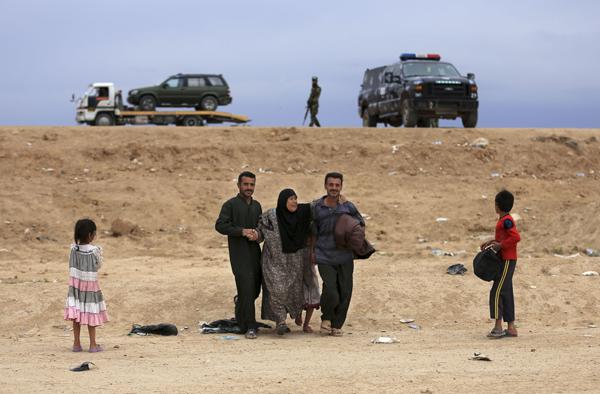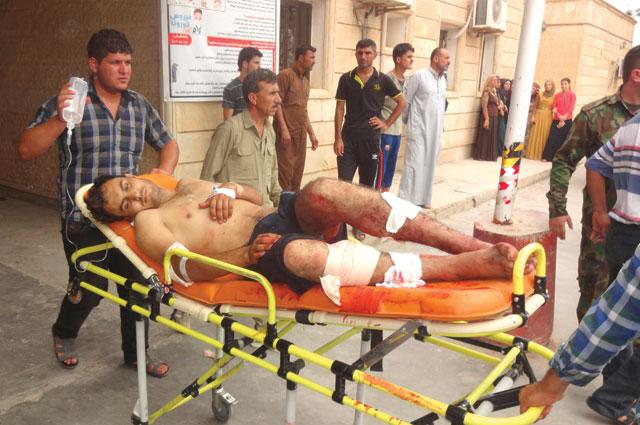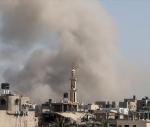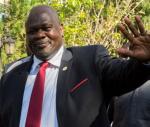You are here
Iraq forces at critical juncture as Anbar teeters
By AFP - Oct 13,2014 - Last updated at Oct 13,2014
BAGHDAD — A string of jihadist attacks has shrunk the Iraqi government's footprint in Anbar to a bare minimum and officials are warning time is running out to save the western province from falling completely.
The region's police chief was killed on Sunday by a roadside bomb blast as he led forces battling Islamic State (IS) fighters on the outskirts of provincial capital Ramadi.
His death was the latest setback suffered by the government in Anbar, a vast Sunni region, parts of which IS had control over even before it launched its sweeping June offensive in Iraq.
Kurdish and federal troops backed by US-led air strikes have pinned back their enemy and notched up gains in northern Iraq in recent weeks, but in Anbar the jihadists have retained the initiative.
A senior US defence official told AFP that the Iraqi's army position in Anbar was "tenuous".
"They are being resupplied and they're holding their own, but it's tough and challenging," the official said. "I think it's fragile there now."
The latest retreat came as recently as Sunday, when around 300 government forces abandoned a camp outside the city of Heet to join other forces holed up at Asad air base, deeper in the desert.
IS had already taken control of the city centre following deadly attacks which the UN said caused the displacement of an estimated 180,000 people.
“Heet is now 100 percent under IS-control,” a senior Anbar police official said Monday.
Anbar is Iraq’s largest province, a vast arid expanse traversed by the Euphrates and which borders Syria, Jordan, Saudi Arabia and the governorate of Baghdad.
IS-led insurgents control Fallujah, 50 kilometres west of Baghdad, Qaem, nearly 300 kilometres farther west on the border with Syria, and most of in between.
Thanks in part to intensive US air strikes, government forces backed by Sunni tribal fighters opposed to IS have retained control of Haditha Dam, the country’s second largest, and a handful of other areas.
US ground troops
But the noose is tightening around Ramadi, parts of which are already under IS control.
“We can say that 85 per cent of Anbar is under IS control,” Faleh Al Issawi, the deputy head of Anbar provincial council, told AFP.
He argued that a ground intervention by US troops was the only measure that could rescue Ramadi and the rest of the province.
“If the situation continues to evolve in the same direction and foreign ground forces don’t intervene within the next 10 days, the next battle will be on Baghdad’s doorstep,” Issawi said.
Ahmed Abu Risha, one of the most prominent anti-jihadist tribal chiefs in Anbar, has also advocated a US ground intervention.
Yet both Iraq’s new prime minister, Haider Al Abadi, and Washington have ruled this out.
“It is Iraqis in Anbar who will have to fight for Anbar,” US Secretary of State John Kerry said Sunday.
Some experts argue that US-led air strikes would be more effective if they came in support of an attacking army dictating the tempo on the ground and forcing IS to react.
Abadi has retired some top brass in recent weeks and laid out a broad outline of measures to reform the security apparatus and rid it of corruption and patronage.
Some of the hundreds of US officers who have been deployed to Iraq in an advisory capacity have been helping Baghdad plan its next move in Anbar.
But it remains unclear whether Iraq’s army, sometimes described as a “checkpoint army” with only a few thousand elite forces really capable of fighting IS, can buck the trend in Anbar.
One captain told AFP last week his entire battalion had withdrawn from a base in Albu Eitha, just east of Ramadi, after spending days holed up in the compound with little food and water.
“We are in Tharthar now, the withdrawal went smoothly but I don’t know what we can do from here... Morale is low among the soldiers,” he said.
Related Articles
BAGHDAD — Iraqi forces retook the town of Heet from the Daesh terror group on Thursday after weeks of fighting, the military said, the lates
Iraqi security personnel and tribesmen beat back an hours-long jihadist attack on a key city west of Baghdad Wednesday while reinforcements reached a strategic town threatened by militants, officials said.
A roadside bomb killed the police chief of Iraq's battleground province of Anbar Sunday, officials said, after the Pentagon expressed concern about a renewed offensive by jihadists in the area.


















